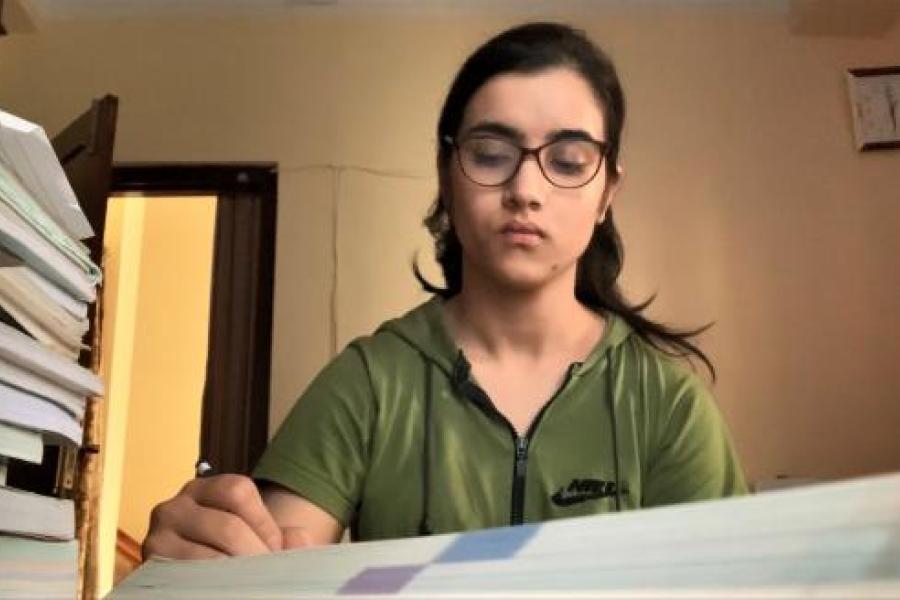Living in uncertainty

Recently recovered from COVID-19 herself, medical student Shitanshu Dhakal reflects on the mental health fallout of the crisis, particularly for young people
Kathmandu, Nepal: A little over a month ago, Shitanshu Dhakal had felt like her worst fears had come true. The 20-year-old medical student from Kathmandu recalls being hit with anxiety upon learning that she and her entire family – father, mother and younger sister – had all tested positive for COVID-19.
“It’s something you hope would never happen,” she says. “It was terrifying.”
Luckily, the family was able to recover in isolation in their home, without complications or hospitalization. And given that they had all contracted the disease, family members didn’t feel the need to isolate separately from one another – a small silver lining, according to Shitanshu.
For Shitanshu, that first-hand experience of a disease that has caused so much loss and devastation across the country, truly drove home not just the direct health impacts of COVID-19, but also offered her further insight on the indirect burdens, especially on mental health.
Mental health also happens to be area in which Shitanshu has a particular interest: In 2020, she and a number of other fellow students of medicine at the Patan Academy of Health Sciences had worked on setting up a digital peer support system, designed to create mental health support networks within schools. In fact, Aarogya, as the group called themselves, had been one of the top two teams at the Generation Unlimited Youth Challenge 2020 in Nepal, co-hosted by UNDP and UNICEF.
“This uncertainty has gone on for so long, it feels unending. And all the while, young people are missing out on their education, activities, being around friends and feeling productive in general.”

Shitanshu reveals how she herself has lately started to feel a considerable dip in motivation compared to this time last year. “Back then, it felt temporary – you told yourself you just had to be patient, and find new ways to bide your time,” she says. “But now, it’s like we’re back to square one, and it’s even more difficult to stay positive.”
That struggle, Shitanshu believes, is vastly greater in the case of young people who were already dealing with mental health issues prior to the pandemic, and on whom the protracted loneliness and anxiety brought on by the current crisis must certainly be having an “unimaginable impact”.
The constant barrage of unverified news and information, especially on social media, is also detrimental to mental well-being, she says. “It can get too much and it’s not healthy… for a time, I deactivated my accounts just to take a break.” This is something she would recommend to others feeling similarly overwhelmed by the online noise.
Of course, it hasn’t all been entirely bleak, according to Shitanshu. The start of the vaccination campaign earlier this year had brought great hope to her and the country – Shitanshu has received both doses of the vaccine herself, and her parents have each gotten the first. This played a major role, she believes, in preventing them from developing severe symptoms even after contracting COVID-19. She hopes that the shortfall in vaccine supply will be resolved quickly, so that “everywhere, everyone can be vaccinated, safe and healthy.”
In the meantime, she is determined to continue working with her team to find ways to strengthen access to mental health support for young people, and to bring more attention to the issue in general.
“Young people need to be supported, they need to be engaged and they need to be heard.”
Nepal already has one of the highest suicide rates in the world, and COVID-19 has further exacerbated the situation, exerting a profound impact on the mental health of young people, who are overwhelmed by months of heightened isolation, psychosocial distress, uncertainty and sometimes combined with experiences of trauma and loss. In this context, UNICEF is supporting the child and adolescent mental health (CAMH) programme, run by the Kanti Children’s Hospital and CWIN Nepal to train psychosocial counsellors, teachers, school nurses, frontline healthworkers and caregivers in providing psychosocial support to children.

